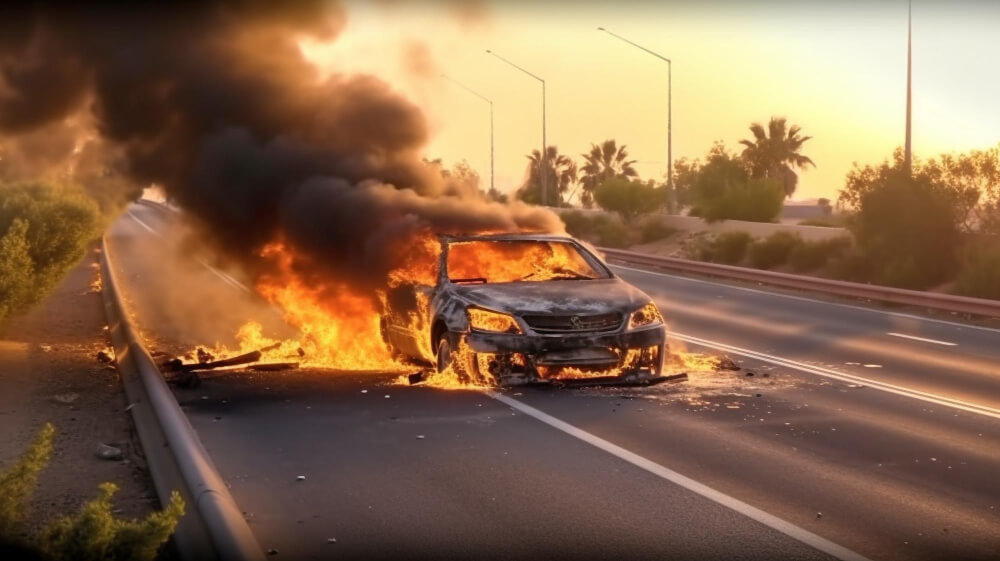
Car fires are terrifying and potentially deadly incidents that can occur suddenly and without warning. While modern vehicles are designed with numerous safety features to mitigate the risk of fires, accidents can still happen due to various factors such as mechanical failures, electrical faults, or collisions. However, there are proactive steps that drivers can take to reduce the likelihood of car fire accidents and ensure their safety on the road. In this comprehensive guide, we'll explore essential tips for avoiding car fire accidents and discuss insurance insights to help drivers protect themselves and their vehicles.

1. Regular Maintenance Checks
Routine maintenance is crucial for keeping your vehicle in optimal condition and minimizing the risk of mechanical failures that could lead to fires. Schedule regular inspections with a qualified mechanic to check for any signs of wear and tear, leaks, or malfunctioning components. Pay particular attention to the engine, fuel system, exhaust system, and electrical wiring.
2. Monitor Fluid Levels
Maintaining proper fluid levels, including engine oil, coolant, brake fluid, and transmission fluid, is essential for preventing overheating and mechanical issues that could trigger a fire. Check fluid levels regularly and top them up as needed according to the manufacturer's recommendations. Address any leaks promptly to prevent fluid from coming into contact with hot engine components.
3. Check Electrical Systems
Electrical faults are a common cause of car fires, often resulting from worn-out wiring, faulty components, or overloaded circuits. Inspect your vehicle's electrical system regularly, including the battery, alternator, starter motor, and wiring harnesses. Look for signs of frayed wires, corrosion, or loose connections, and have any issues repaired by a qualified technician.
4. Be Cautious with Modifications
Modifying your vehicle with aftermarket accessories or performance upgrades can enhance its appearance and performance but may also increase the risk of fires if not installed or used correctly. Be cautious when making modifications and ensure that all components are installed according to manufacturer guidelines. Avoid overloading electrical circuits or making changes that could compromise safety systems.
5. Practice Safe Fueling
Fuel leaks or spills during refueling can pose a significant fire hazard, especially in the presence of hot engine components or ignition sources. Exercise caution when refueling your vehicle, and avoid overfilling the tank. If you notice any fuel odors or leaks, stop refueling immediately and address the issue before driving the vehicle.
6. Monitor Warning Signs
Be vigilant for warning signs that could indicate potential fire hazards, such as strange smells, smoke, sparks, or warning lights on the dashboard. If you notice any unusual symptoms while driving, pull over to a safe location, turn off the engine, and investigate the source of the problem. Do not attempt to drive the vehicle if you suspect a fire or other serious issue.
7. Carry a Fire Extinguisher
Having a fire extinguisher on board can be a lifesaver in the event of a car fire. Make sure your vehicle is equipped with a properly rated fire extinguisher and that you know how to use it effectively. Store the extinguisher in an easily accessible location within the vehicle, such as the trunk or under a seat, and inspect it regularly to ensure it is in good working condition.
Car fire accidents can have devastating consequences, but by following these essential tips, drivers can reduce the risk of fires and increase their safety on the road. Regular maintenance checks, monitoring fluid levels, practicing safe fueling habits, and carrying a fire extinguisher are all proactive measures that can help prevent car fires from occurring. Additionally, ensuring that you have adequate insurance coverage in place provides added peace of mind knowing that you're financially protected in the event of a fire-related incident. By staying vigilant and prepared, drivers can minimize the likelihood of car fire accidents and enjoy safer travels wherever the road may lead.
Insurance Insights
While taking proactive steps to prevent car fires is essential, having the right insurance coverage in place is equally important for protecting yourself and your vehicle. Make sure your auto insurance policy includes comprehensive coverage, which typically covers fire damage, in addition to liability and collision coverage. Review your policy carefully to understand coverage limits, deductibles, and exclusions related to fire damage.
We're Here When You Need Us:
Budget Insurance Agency
Whether you're looking to update your current policy, explore new coverage options, or simply have questions about your insurance, Budget Insurance Agency is here to help. Contact us at 855-218-6308 or request an online quote right now!